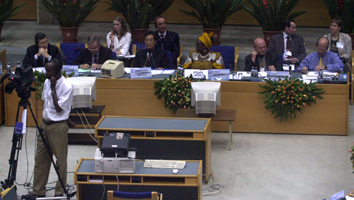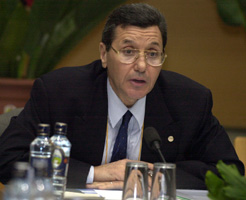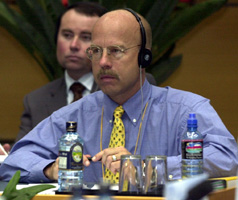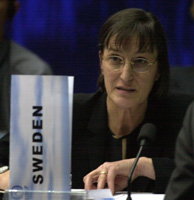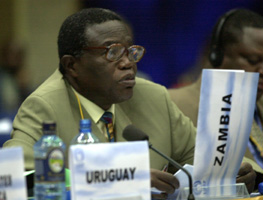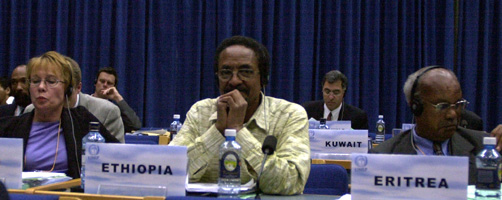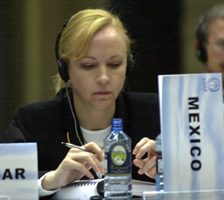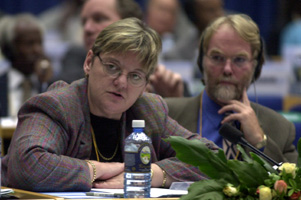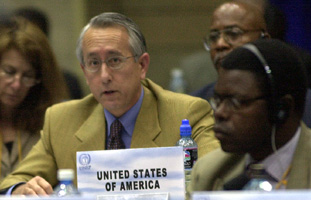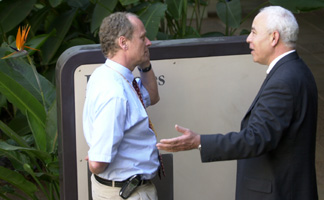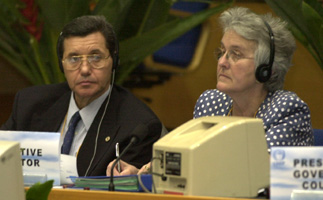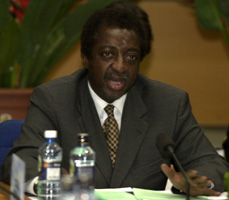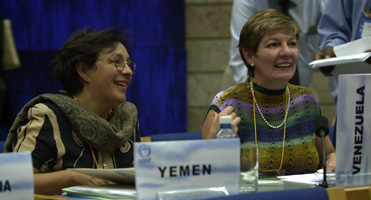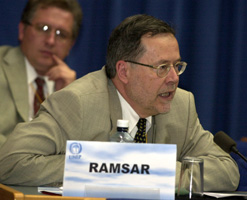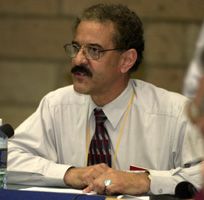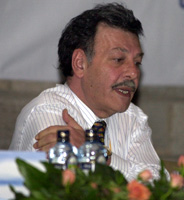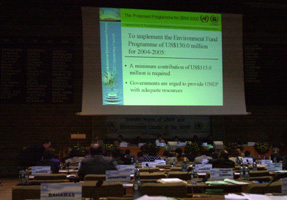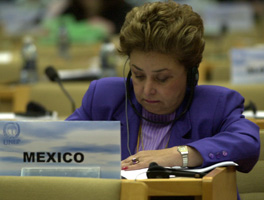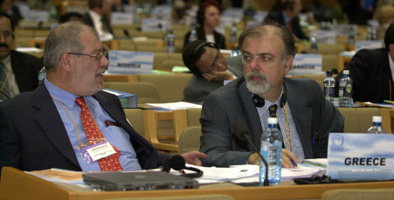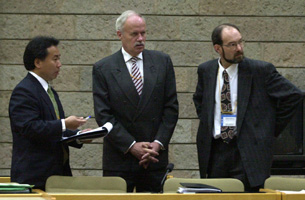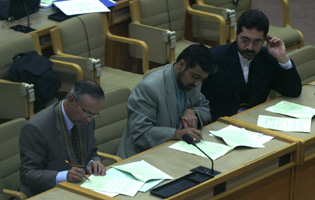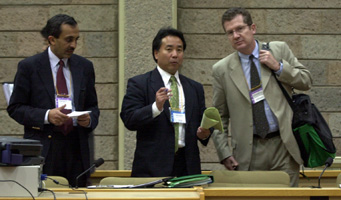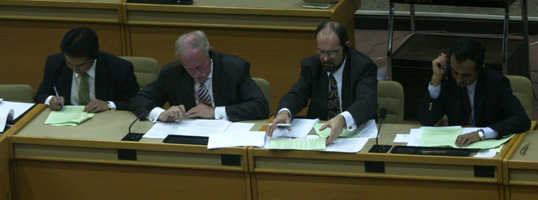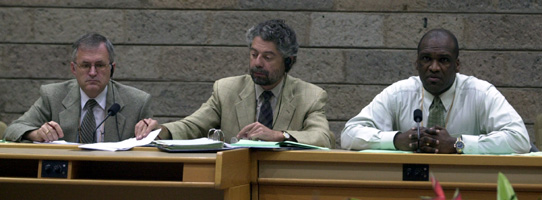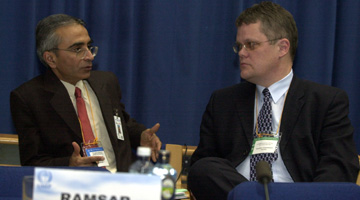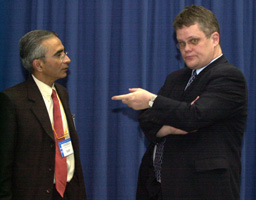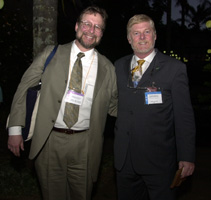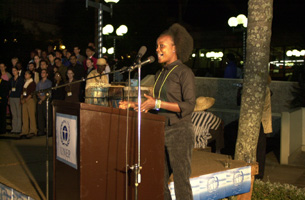|
Twenty Second Session
of the Governing Council/Global Ministerial Environment Forum Highlights from Tuesday, 4 February Delegates met in Plenary throughout the day, discussing policy issues, outcomes of the World Summit on Sustainable Development (WSSD), and linkages among environment-related conventions, with a particular focus on chemicals, trade and water issues. The Committee of the Whole (COW) also met in morning and afternoon sessions to consider programmatic, administrative and budgetary matters, the state of the environment, emerging policy issues, and the role of civil society. A drafting committee convened to begin deliberations on various draft decisions, and contact groups were formed on the budget and chemicals. Photo: Morning Plenary session on chemicals and trade (left to right): Hussein Abaza, Chief of UNEP's Trade Programme, Jacqueline Aloisi de Larderel, UNEPGoverning Council President Ruhakana Rugunda, Beverly Miller, Secretariat, Rapporteur Václav Hubinger, and Jim Willis, Director of UNEP's Chemicals Programme |
|
Plenary: Chemicals, Trade and Water
|
|
Governing
Council Vice-President Suk Jo Lee (Republic of Korea) presided over the
morning Plenary session
|
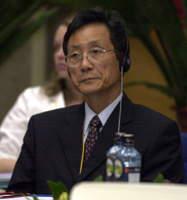 |
|
Jim
Willis, Director of UNEP's Chemicals Programme, reported on its work (UNEP/GC.22/10/Add.1)
and highlighted the focus on issues emphasized at the WSSD. Drawing attention
to chemicals-related draft decisions before the Governing Council (UNEP/GC.22/L.1),
he noted that some delegations - including the EU, Norway, Switzerland,
and US - had submitted alternative texts.
|
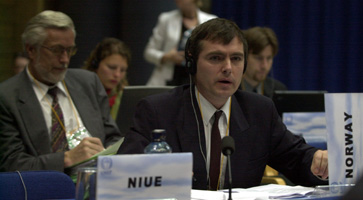 |
On the global mercury
assessment, the EU and Norway (left) supported a legally-binding
instrument, while Canda, Colombia, the Czech Republic, and Mexico opposed
it. |
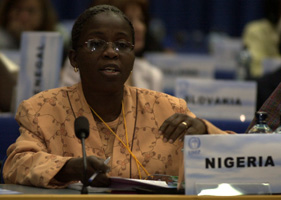 |
Nigeria (left)
|
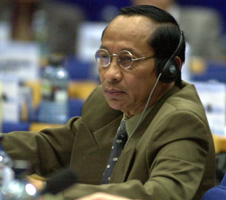 |
|
|
|
|
|
Mexico (left) opposed a legally binding instrument on mercury assessment Jennifer Macmillan, New Zealand (right) |
|
The US and
others opposed a proposal that UNEP host bi-annual meetings of environment
and trade ministers. The US also said capacity building was the best entry
point for UNEP's work on trade issues. |
|
Beat Nobs (Switzerland) with CBD Executive Secretary Hamdallah Zedan |
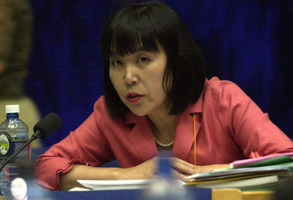 |
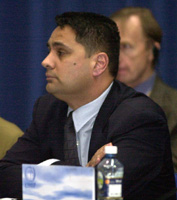 |
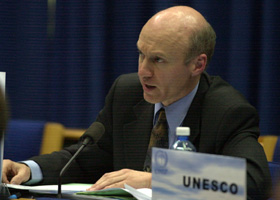 |
|
|
|
|
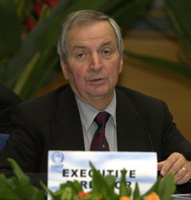 |
|
|
|
Governing
Council President Ruhakana Rugunda and Beverly Miller, Secretariat
|
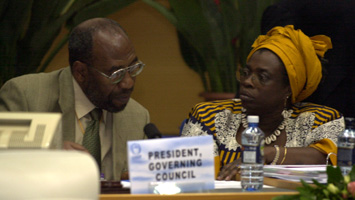 |
| Ana Elisa Osorio, Venezuelan
Environment Minister (right) underscored water as a public good. |
|
Ahmed
M. Hassan, International Federation of Red Cross and Red Crescent Societies
|
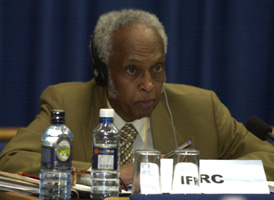 |
|
Committee
of the Whole
|
UNEP Deputy Executive Director Shafqat Kakakhel Excerpts from Kakakhel introduction to the budget |
|
Delegates
from Mexico and Brazil
|
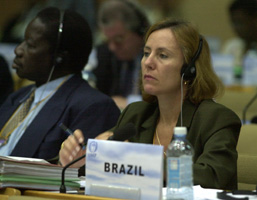 |
| Delegates from Greece during the morning session of the Committee of the Whole |
|
Drafting
Group
|
|
Contact
Group on the Budget
|
|
Contact
Group Chair John Ashe (Antigua and Barbuda) is seated on the right with
members of the Secretariat
|
|
Contact
Group on Chemicals
|
|
Contact group chair Halldór Thorgeirsson (Iceland) (right) In the Chemicals Contact Group, chaired by Halldor Thorgeirsson (Iceland), developed countries emphasized the need for openness and transparency in the strategic approach to international chemicals management, suggesting that key recommendations be drawn from GCSS-7/GMEF-3 and the WSSD outcomes, the Bahia Declaration, and the steering committee on the strategic approach. Delegates stressed the need for clarity and avoiding duplication of other organization's work in formulating a mercury programme. |
|
Miscellaneous
Photos
|
|
A
youth delegate speaks at a reception hosted by UNEP
|
|
Links
|
|
Back to Linkages home - Visit IISDnet
- Send e-mail to ENB |


